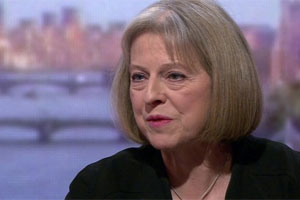Index relies entirely on the support of donors and readers to do its work.
Help us keep amplifying censored voices today.
Banning hate preachers from the airwaves is the wrong response
Theresa May’s proposals to ban radical preachers from the airwaves and block extremist websites are illiberal, impractical and may breach the UK’s commitment to human rights.
What a difference a month makes. Just weeks after a Queen’s Speech that heralded the end of the draft Communications Data Bill (aka the ‘Snoopers’ Charter’), the government seems to be mounting a dramatic U-turn after the attack in Woolwich. Home Secretary Theresa May has signalled plans are afoot for wider surveillance powers, new bars on the broadcast of radical preachers and the blocking of extremist websites. This is the wrong response. Not only would these measures be wrong in principle, they are likely to make the fight against extremism harder as the government undermines the values it seeks to promote.
It is expected that a new task force will propose granting Ofcom the power to pre-emptively bar radical preachers from the television, in response to Anjem Choudary’s invitation onto Newsnight. Right now, Ofcom can intervene after an unacceptable broadcast has been made. It’s not as if Ofcom wants additional powers – it has publicly stated its powers are already sufficient to tackle extremism on television and the internet. Not unreasonably, Ofcom doesn’t want to get into the censorship game with its staff instructing TV stations which preachers they can and cannot broadcast. It’s not even clear how pre-emptive censorship would work – is the Home Secretary going to create a list of people so undesirable they can’t appear on television (but not so extremist they could be prosecuted for an actual crime)? This heavy-handed political interference in the working of the media would be totally unacceptable in a free country. Former Home Secretary Jack Straw, John Whittingdale MP and former BBC director-general Greg Dyke have all expressed their concerns over this knee-jerk response with Dyke adding: “The point is that the BBC makes its own editorial decisions. If they turn out to be wrong someone can make a complaint to Ofcom afterwards. But you fundamentally change the BBC’s role if they can intervene before. It isn’t workable.”
This isn’t in fact a new proposal. The British government has tried this tactic before by censoring the voices of leading Sinn Fein spokespeople. After a visit to Poland during which Margaret Thatcher told her Communist hosts ‘In modern societies, success depends on openness and free discussions’, her government back home banned the voices of groups associated with terrorism from television. Instead actors had to dub over the words spoken by these group’s spokespeople. Not only was the legislation unworkable, it was embarrassing. When Gerry Adams visited the USA in February 1994, US broadcasters boasted of carrying the voice of ‘the man whose voice is banned in Britain’. There is little doubt Choudary would exploit any ban on his appearance on TV.
Today on Index: Brazilian court gags protester in latest social media ruling | Free expression in the news
Time is running out
Think you have what it takes to be published by Index on Censorship? Here’s your chance to find out. Enter our blogging contest for a chance to win £100. More >>>
Index on Censorship Events
Caught in the web: how free are we online? June 10, 2013
The internet: free open space, wild wild west, or totalitarian state? However you view the web, in today’s world it is bringing both opportunities and threats for free expression. More >>>
This embarrassment would have profound implications for our role in attempting to promote freedom in the world. How would the Foreign Office be able to decry the trampling of media or internet freedom in Belarus or Iran, if the Home Secretary is busy creating the lists of individuals banned from British TV and which websites to block? How would the British government point to the principle of freedom of expression after controversies such as the Innocence of Muslims when it would be censoring individuals before they have even aired views?
Tough laws are already in place. The Terrorism Act 2000 has proven too broad in scope and detrimental towards freedom of expression. Section 57 of the Terrorism Act makes it illegal to possess an article for a purpose connected with terrorism which has criminalised the study of extremist or terrorist ideology. In 2008, Rizwaan Sabir, a student was arrested on suspicion of possessing extremist material after he worked on his PhD on radical Islamic groups. He was arrested and detained for 6 days and subsequently released without charge. Curtailing researchers’ ability to examine and deconstruct terrorism is just one way in which this law is detrimental to our security.
Anjem Choudary will have his fingers crossed for a TV ban, so he can level the charge of hypocrisy at the British government. Theresa May should not rise to the bait. Inciting violence is already illegal, the law should be enforced. Yet, creating lists by political dictat of who can and can’t appear on TV or the internet is a step too far. If we are to tackle violent extremism it will require the full exposure of flawed opinions to open scrutiny.
Michael Harris, Head of Advocacy, Index on Censorship. Follow him on Twitter @mjrharris
Theresa May’s comments on the Andrew Marr Show have lead to a round of speculation around the actions that the Home Secretary will take in the wake of Woolwich, especially in regard to the shelved Communications Data Bill.

Home Secretary Theresa May appeared on the Andrew Marr Show. See the video. (Photo: BBC)
Kirsty Hughes, Chief Executive of Index on Censorship said:
“May is using Woolwich as an excuse to argue for bringing back a totally disproportionate measure of population-wide data collection that no democracy should countenance. The law already allows for those inciting violence to be prosecuted. The best way to contest hate speech is with more speech not less speech. The government shouldn’t be creating lists of who should and shouldn’t appear on TV.”
May told Marr on Sunday, “we need to see if there are additional steps we should be taking to prevent radicalisation”.
May told the BBC One host that the government would be looking at banning orders, as well as the role of Ofcom.
“There is no doubt that people are able to watch things through the internet that can lead to radicalisation,” she said.
 The coalition’s plan to store information on every citizen’s use of email, the web, and phones have been dealt a serious blow by a parliamentary committee report. Padraig Reidy reports
The coalition’s plan to store information on every citizen’s use of email, the web, and phones have been dealt a serious blow by a parliamentary committee report. Padraig Reidy reports
Education secretary Michael Gove gave a staunch defence of press freedom at the Leveson Inquiry today.
“By definition, free speech doesn’t mean anything unless some people are going to be offended some of the time,” Gove said, saying he was “unashamedly” allied with “those who say we should think very carefully about regulation.”
“The case for regulation needs to be made strongly before we curtail liberty,” Gove said, adding that he felt the existing laws of the land were sufficient to deal with miscreant reporters.
“The experience we have of regulation is that sometimes good intentions result in the curtailment of individual freedom and an unrealistic expectation of how individuals behave,” he said, noting that on occasion regulation had been sought to “deal with failures of character or morality”.
In a tense exchange with Lord Justice Leveson, Gove attacked what he saw as a “tendency to meet a particular crisis, scandal or horror with an inquiry”, and expressed his “fear for liberty” if principles of free speech were to be eroded with tougher regulation.
Leveson went head-to-head with Gove, a former Times leader writer, responding: “Mr Gove, I don’t need to be told about the importance of free speech. I really don’t.”
Gove has previously spoken of his fear that the Inquiry, launched last summer to examine press standards in the wake of the phone hacking scandal, had created a “chilling atmosphere towards freedom of expression”.
However he did not deny the judge’s suggestion of substantial public concern over questionable press behaviour, arguing that it had “pre-dated the last 50 years”.
Elsewhere in his evidence, which he peppered with references to the Roman republic and quotations in Latin, Gove was unapologetic about his contacts with other media figures, stressing he tried to exercise “appropriate judgment on all occasions”. He referred to Rupert Murdoch as “one of the most impressive and significant figures” of the last half-century, and said it was “fascinating” to meet media proprietors Viscount Rothermere and Richard Desmond.
Discussing a 19 May 2010 dinner with Murdoch, ex-News International CEO Rebekah Brooks and others at Murdoch’s flat shortly after the formation of the coalition government, Gove said the group discussed education. He added that he had no recollection of discussing Murdoch-owned News Corp’s bid for full control of satellite broadcaster BSkyB at a June 2010 lunch with NI executives, adding that no-one had told him of the bid before its launch later that month.
Asked by counsel Robert Jay QC why the public held politicians and journalists in low esteem, Gove chirped: “‘Twas ever thus.”
Also speaking today was home secretary Theresa May MP, who discussed interim guidance issued by the Association of Chief Police Officers (ACPO) on media-police relations, which were based on “a shift to a blanket non-acceptability” of anything other than “light refreshments and trivial and inexpensive gifts”.
May said the guidance, which ACPO says aim to provide “common sense” principles for officers to follow, would provide greater clarity and consistency about press-police relations, rather than having a “chilling effect”.
The Inquiry continues tomorrow with evidence from justice secretary Ken Clarke and business secretary Vince Cable.
Follow Index on Censorship’s coverage of the Leveson Inquiry on Twitter – @IndexLeveson